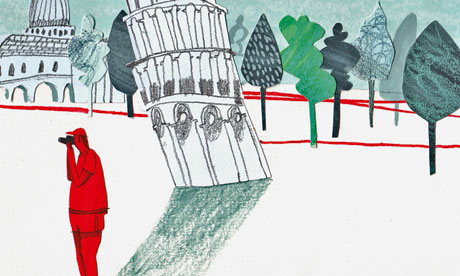
In 1990, in Strasbourg, as the result of a jovial lunch with friends, the French journalist Joel Henry founded the Laboratory of Experimental Tourism – promoting "a new way to travel", he told one interviewer, "based on scientific or pseudoscientific rules. Travelling under such constraints turns travel into a game." Among his proposals were "chance-travel" (rolling a die, then in the index of an atlas counting down that many entries from your hometown, so a resident of Melbourne who rolled a four would end up in Melenki, Russia) and "counter-travel" (journey to famous landmarks, but turn your back on them, and photograph what you see). This may strike you as self-consciously eccentric: what's wrong with staring at old things or getting drunk, like a normal tourist? But in one sense, experimental tourism is refreshingly honest. It cuts to the chase, focusing solely on one of our most basic motivations for travel: the urge to see something – anything – new.
As Winifred Gallagher points out in her (new) book New: Understanding Our Need For Novelty And Change, we can seem rather conflicted about this hunger for newness. Someone who travels widely is praised for their broad horizons, but someone who craves every new gadget is "obsessed"; it's one thing to get your thrills from gobbling up new highbrow novels, another to hunger for the excitement of ever higher stakes at the casino. Partly, this is because novelty-seeking isn't a unitary phenomenon: "sensation-seeking" is associated with problems such as compulsive gambling, criminality and alcoholism, Gallagher explains, while "experience-seeking" is not. More broadly, though – and in a time when "novelty" has come to imply "superficial" – she makes a case for respecting our need for newness.
Relying on work by the psychologist C Robert Cloninger, Gallagher suggests that your stance towards new things – with "neophiliacs" at one end of the continuum and "neophobes" at the other – is a fundamental personality trait; all else being equal, a dose of neophilia is a strong predictor of happiness. There's some credible evolutionary reasoning here. It's obvious how adaptability to change favours survival; even a tendency to mere restlessness, though, could have "helped Homo sapiens survive by spurring our vast African exodus to distant parts unknown".
These days, we're surrounded by "novelty machines", devices designed to bombard us with new stimuli. But the fact that our neophilia can be diverted into trivialities, or exploited by advertisers, isn't an argument against neophilia, any more than the use of sex to sell beer is an argument against sex. Neophilia combined with persistence – to counter the neophile tendency to skip from one thing to another – may be the ideal combination of traits, Gallagher concludes. The quiet heroes, she suggests, are the moderate neophiliacs who recognise the stirrings of the urge and cultivate it, rather than suppressing it: the couple who retire to the big city, instead of to a gated community; the midlife career-switchers who finally decide to stop ignoring the inner call they've been hearing for years. Seeking new experiences seems to have the effect of slowing down perceived time, too, countering the feeling of the weeks flashing past as you age. Embrace neophilia, then, and it'll seem as if you have more time for more of it.
oliver.burkeman@theguardian.com; follow Oliver Burkeman on Twitter

